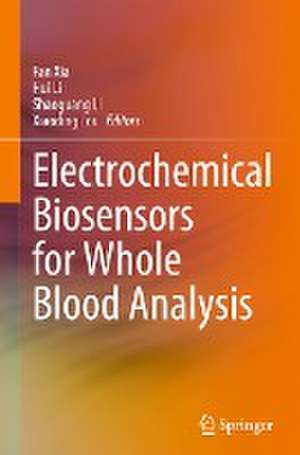Electrochemical Biosensors for Whole Blood Analysis
Editat de Fan Xia, Hui Li, Shaoguang Li, Xiaoding Louen Limba Engleză Hardback – 2 oct 2023
This book illustrates recent advances in developing sensitive and selective electrochemical biosensors for their whole blood application. Known to be a cutting-edge and fast-growing technology, electrochemical biosensors demonstrate their potential in laboratories, industries, and healthcare to achieve specific and direct target detection in complex media, and have become an emerging technology for guiding personalized medicine. The book first demonstrates methods and models to cover the detection of a variety of target molecules in whole blood, including ions, small molecules, nucleic acids, proteins, cells, etc. Then, it provides comments on various detection strategies employed to improve sensors' sensitivity, specificity, selectivity, and reproducibility as well as presenting the laws and principles. In addition, it summarizes achievements and challenges from recent years. Finally, it provides future perspectives and opportunities in electrochemical biosensors including point of care detection, molecular diagnostics and the integration of this sensor platform with multidisciplinary technologies, towards the ultimate goal of personalized medicine. The book integrates abundant viewpoints from multiple sciences and is helpful and valuable to a wide readership in the various fields of biochemistry, biophysics, bioengineering, and pharmaceutics.
Preț: 898.43 lei
Preț vechi: 1095.65 lei
-18% Nou
Puncte Express: 1348
Preț estimativ în valută:
171.93€ • 186.70$ • 144.43£
171.93€ • 186.70$ • 144.43£
Carte disponibilă
Livrare economică 02-16 aprilie
Preluare comenzi: 021 569.72.76
Specificații
ISBN-13: 9789819956432
ISBN-10: 9819956439
Pagini: 267
Ilustrații: VIII, 267 p. 119 illus., 112 illus. in color.
Dimensiuni: 155 x 235 mm
Greutate: 0.66 kg
Ediția:1st ed. 2023
Editura: Springer Nature Singapore
Colecția Springer
Locul publicării:Singapore, Singapore
ISBN-10: 9819956439
Pagini: 267
Ilustrații: VIII, 267 p. 119 illus., 112 illus. in color.
Dimensiuni: 155 x 235 mm
Greutate: 0.66 kg
Ediția:1st ed. 2023
Editura: Springer Nature Singapore
Colecția Springer
Locul publicării:Singapore, Singapore
Cuprins
1. Introduction
2. Electrochemical biosensors and the signaling
3. Electrochemical biosensors for ions detection
4. Electrochemical biosensors for neurotransmitters detection
5. Electrochemical biosensors for metabolites detection
6. Electrochemical biosensors for drugs detection
7. Electrochemical biosensors for amino acids detection
8. Electrochemical biosensors for nucleic acids detection
9. Electrochemical biosensors for microRNA detection
10. Electrochemical biosensors for hepatic and cardiac biomarkers detection
11. Electrochemical biosensors for inflammatory biomarkers detection
12. Electrochemical biosensors for tumor biomarkers detection
13. Electrochemical biosensors for cells and cell exosomes detection
14. Future perspectives of electrochemical biosensors for whole blood analysis
Notă biografică
Fan Xia is a full professor at China University of Geosciences. His research interests and strength focus on the frontier fields of bioanalytical chemistry, particularly with a significant achievement in the field of nanochannels and nanopores for the application of trace biomolecules analysis in complex matrix. His scientific interest is focused on Bio-Analytical Chemistry. He has published more than 150 papers, which were cited by over 8000 times,H-factor is 50.
Hui Li is a full professor at China University of Geosciences. She received her PhD degree from University of Bern as a Marie-Curie fellow and pursued her research as a postdoc fellow at University of California, Santa Barbara, with the support of “Early postdoc mobility” fellowship from Swiss National Science Foundation. Her research focuses on the development of biosensors for the diagnostics of disease and health monitoring.
Shaoguang Li is a full professor at China University of Geosciences. He received his PhD from Lanzhou Institute of Chemical Physics, Chinese Academy of Sciences and was a postdoc fellow at University of Bern and University of California, Santa Barbara. His research interests are the development of functional nucleic acids for bioimaging and biosensor applications.
Textul de pe ultima copertă
This book illustrates recent advances in developing sensitive and selective electrochemical biosensors for their whole blood application. Known to be a cutting-edge and fast-growing technology, electrochemical biosensors demonstrate their potential in laboratories, industries, and healthcare to achieve specific and direct target detection in complex media, and have become an emerging technology for guiding personalized medicine. The book first demonstrates methods and models to cover the detection of a variety of target molecules in whole blood, including ions, small molecules, nucleic acids, proteins, cells, etc. Then, it provides comments on various detection strategies employed to improve sensors' sensitivity, specificity, selectivity, and reproducibility as well as presenting the laws and principles. In addition, it summarizes achievements and challenges from recent years. Finally, it provides future perspectives and opportunities in electrochemical biosensors including point of care detection, molecular diagnostics and the integration of this sensor platform with multidisciplinary technologies, towards the ultimate goal of personalized medicine. The book integrates abundant viewpoints from multiple sciences and is helpful and valuable to a wide readership in the various fields of biochemistry, biophysics, bioengineering, and pharmaceutics.
Caracteristici
Highlights strategies and clinical applications of electrochemical biosensors
Describes whole blood detection of electrochemical biosensors
Provides a blueprint for molecular measurements in whole blood
Describes whole blood detection of electrochemical biosensors
Provides a blueprint for molecular measurements in whole blood
